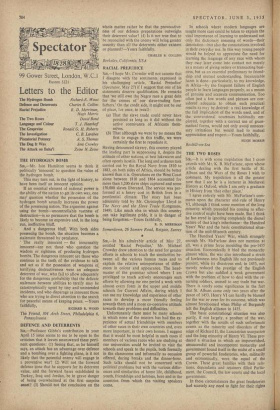SIR,—In his admirable article of May 27, entitled 'Racial Prejudice,'
Mr. Michael Crowder drew attention to the need for greater efforts in schools to teach the similarities be- tween all the various human races and to explain the relative unimportance of differ- ences in colour and appearance. The head- master of the grammar school where I am privileged to teach actively encourages such efforts' by allowing me one period a week with almost every form in the upper and middle schools for Current Affairs, during which I can use my knowledge and experience of other races to develop a more friendly feeling towards them and a more co-operative attitude towards their problems and difficulties.
Unfortunately there must be many schools in which none of the masters has had the ex- perience of actual friendships with members of other races in their own countries and, even more important, in their own homes. I suggest that it would be most helpful in such cases if members of various races who are studying at our universities could be invited to visit the schools and speak to the pupils, both formally in the classrooms and informally as occasion offered, during breaks and the dinner-hour. Such talks should not be concerned with political problems but with the various differ- ences and similarities of home life, childhood, youth, friendships and hobbies, here and in the countries from which the visiting speakers come. • In schools where modern languages are taught more care could be taken to explain the vital importance of learning to understand not only the dictionary meaning of words—their denotation—but also the connotations involved in their everyday use. In this way young people would be helped to appreciate frie need for learning the language of any race with whom they may later come into contact not merely as a means of giving orders or transacting busi- ness, but as an essential preliminary to friend- ship and mutual understanding. Incalculable harm is done—particularly, to my knowledge, in Africa—by the frequent failure of English people to learn languages properly, as a means of genuine and accurate communication. Too often just a few words and phrases are con- sidered adequate to obtain such practical results as may be desired : a real knowledge of the full implication of the words used, and of the conventional courtesies habitually em- ployed, together with a correct use of gram- matical forms, would not only avoid unneces- sary irritations but would lead to mutual appreciation and respect.—Yours faithfully, Bexhill-on-Sea
HUGH MORRIS


































 Previous page
Previous page